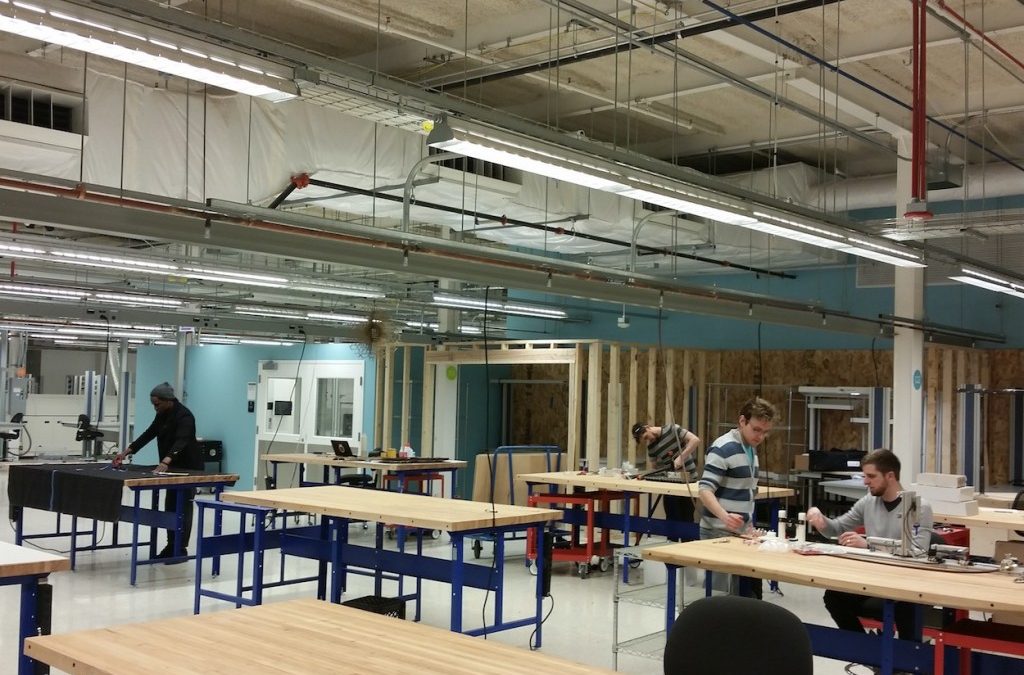Nuha Nazy and Emilia Rogowska set out to create a space that gave people the ability to quit their 9-to-5 jobs.
The duo opened the doors to Z-Axis Factory last October, a 15,000 square-foot coworking and maker space in Pilsen that had everything from a CNC machine to glass cutting tools to direct-to-garment printing. The idea was to create a space where artists and engineers alike would have access to the expensive machinery and resources necessary to creating a business around physical startups. So far, it’s worked—they have 25 members, who range from the designers behind clothing line Miss Lynn Designs, to a woodworker creating a line of laser-cut bowties, to money counterfeiter-turned-artist Art Williams Jr.
“There’s a lot of places to go to have a cup of coffee and think about your idea, there are very few where you can go and start generating revenue,” said Nazy. “Z-Axis is that place for artists and makers in Chicago.”
Chicago has historically been a strong software and digital startup hub. But a handful of new spaces and resources are providing the infrastructure for a new type of founder: A hybrid maker-entrepreneur that’s looking to create products that can be manufactured and businesses that can scale. And their efforts are creating a new maker and tech community in Chicago.
“In the past people haven’t considered [making as a job] as much, because there haven’t been avenues to turn passions into careers,” said Bill Fienup, founder and managing director of product and manufacturing space mHUB. “But now you can monetize some of these passions.”

mHUB, the city’s first space devoted entirely to product prototyping and manufacturing, is the biggest bet on this new type of entrepreneur. It’s a 63,000 square foot facility in an old Motorola Mobility prototyping lab in West Town that officially opened it’s doors to the public in March. The expanded space also marks the hardware community’s transformation from hobbyist-maker to supporting growing ventures: mHUB’s predecessor, hardware coworking space Catalyze, which Fienup also led, was packed into a small building in the West Loop overflowing with tools, workbenches and entrepreneurs hunched over prototypes.
mHUB, by contrast, is filled it with over $2.5 million in prototyping and manufacturing equipment. They also have the capability to do a small-scale manufacturing run of hardware entrepreneurs’ products, a key missing link for maker-entrepreneurs, as larger manufacturers often pass on shorter, less profitable product runs.
Many of mHUB’s current members are holdovers from Catalyze (including the founders of Curious Technologies, the startup behind concussion-detecting device NWTN, and recent finalists on America’s Greatest Makers, and Guard Llama, which was just funded on Shark Tank). But they’re growing fast—they’re up to 130 members since officially launching last month, and have capacity for 1,000. Fienup believes that the quality of startups and products is improving too (think startups from former Motorola engineers, he says).
“We’re getting those higher caliber teams because we have more advanced resources,” Fienup added.
Kickstarter cofounder Charles Adler opened the doors to his maker, tech and arts-focused space Center for Lost Arts on Goose Island last summer, with the goal of bringing the collaboration that fueled the maker movement online to a physical space. As someone who learned to code through shared resources and “barter of knowledge” in the online maker community, he knew collaboration and collision can lead to much bigger things (launching a site like Kickstarter, for example).
As a result, Lost Arts attracts an entrepreneur that’s comfortable collaborating and blurring the lines between disciplines. “People [are] sharing information about fundraising, about electronics, about product design, about marketing, about art,” he said. “And it’s not necessarily artist to artist. It looks more like…

